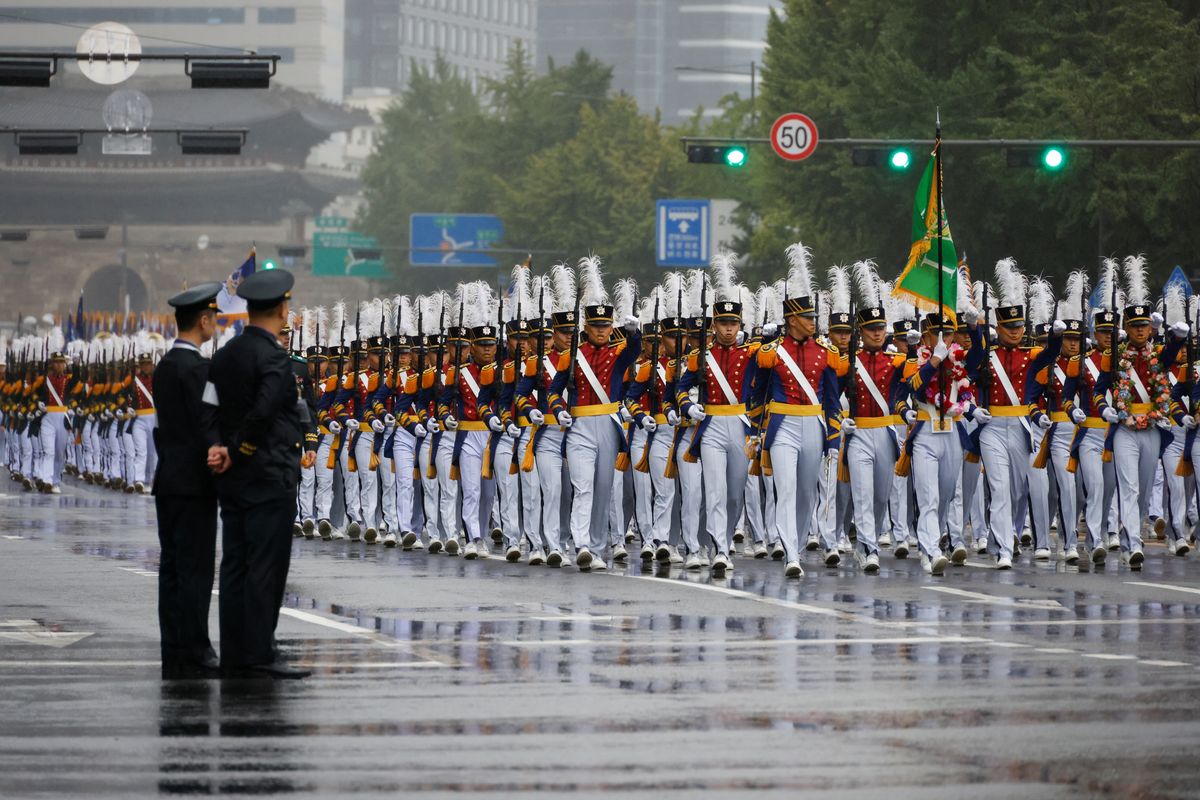South Korea holds a rare military parade as geopolitical tensions rise
On Tuesday, Seoul held a military parade for Armed Forces Day, the first event like this in about a decade.

A few minutes every morning is all you need.
Stay up to date on the world's Headlines and Human Stories. It's fun, it's factual, it's fluff-free.
The backstory: Over the past couple of years or so, tensions between North and South Korea have been rising over an escalation of security threats. This year, North Korea carried out a record number of ballistic missile tests, which South Korea (and Japan and the West) sees as a security threat. Last month, North Korea essentially said it had been practicing for a nuclear strike against South Korea as well as rehearsing occupation of the country if a conflict erupted. And since last year, international intel has seen activity at the country’s underground nuclear test site.
Meanwhile, South Korea has been partnering up with Japan and the US to hold joint military exercises, which also seem to be irking its northern neighbor. Last month, leaders of the three countries held a historic summit in the US at Camp David to reaffirm their alliances. At the same time, South Korea’s arms industry has been growing, exporting US$7 billion of defense goods in 2021, according to the Export-Import Bank of Korea. Since taking office last year, South Korean President Yoon Suk Yeol has been working to make the country one of the world’s top four arms exporters.
More recently: Last week, North Korea and Russia made headlines when North Korean leader Kim Jong Un and other officials visited Russia, where they saw its nuclear-capable strategic bombers and hypersonic missiles. There have been (unconfirmed) reports that Russia is working on an arms deal with North Korea for its war in Ukraine to get around Western sanctions. This could be a sign that the countries’ military ties are getting stronger and that North Korea might turn to Russia to help it build up its nuclear supply.
To shore up trilateral ties in the region, diplomats from South Korea, China and Japan agreed this Tuesday to meet as soon as they can. They agreed to have a summit every year since 2008, but COVID has derailed the last few years. Moving toward rebooting these summits is partly seen as a reassurance to China, given the growing alliance between Japan, South Korea and the US.
The development: On Tuesday, Seoul held a military parade for Armed Forces Day, marking the 75th anniversary of the country establishing its military. This is the first time South Korea has held a military parade like this in a decade.
The event featured new-age tanks, drones and missiles; thousands of South Korean troops marched along with all of this equipment. Over 300 US troops were also involved. There was supposed to be an airshow, too, but it was canceled because of the rainy weather. Even with the rain, crowds showed up to watch the event. But, before the parade started, President Yoon made a speech, which included a dire warning to North Korea against using nuclear weapons.
Key comments:
"Based on battle-ready combat capabilities and a solid readiness posture, our military will immediately retaliate against any North Korean provocation," South Korean President Yoon Suk Yeol said at the ceremony before the parade. "If North Korea uses nuclear weapons, its regime will be brought to an end by an overwhelming response from the alliance."
“[The parade and Yoon] help portray [South] Korea to the Korean people that the country is now an important power on the world stage, a pivotal global power as the current president calls it,” says Peter Layton, a visiting fellow at the Griffith Asia Institute at Griffith University.
"We unanimously believe that carrying out cooperation is in the common interests of the three parties," Chinese foreign ministry spokesperson Wang Wenbin said on Tuesday regarding resuming the three’s yearly summits. "We should work together to strengthen practical cooperation ... and make new contributions to regional peace, stability and prosperity."
"I'm sure there should be some discomfort on their side regarding our increasingly close trilateral security partnerships with the United States and Japan," said a South Korean official to Reuters, speaking on condition of anonymity because of the sensitivity of the situation. "There seems to be a view there that they need to properly manage bilateral ties with us, as they saw how their THAAD responses backfired and fuelled anti-China sentiment to serious levels."




Comments ()